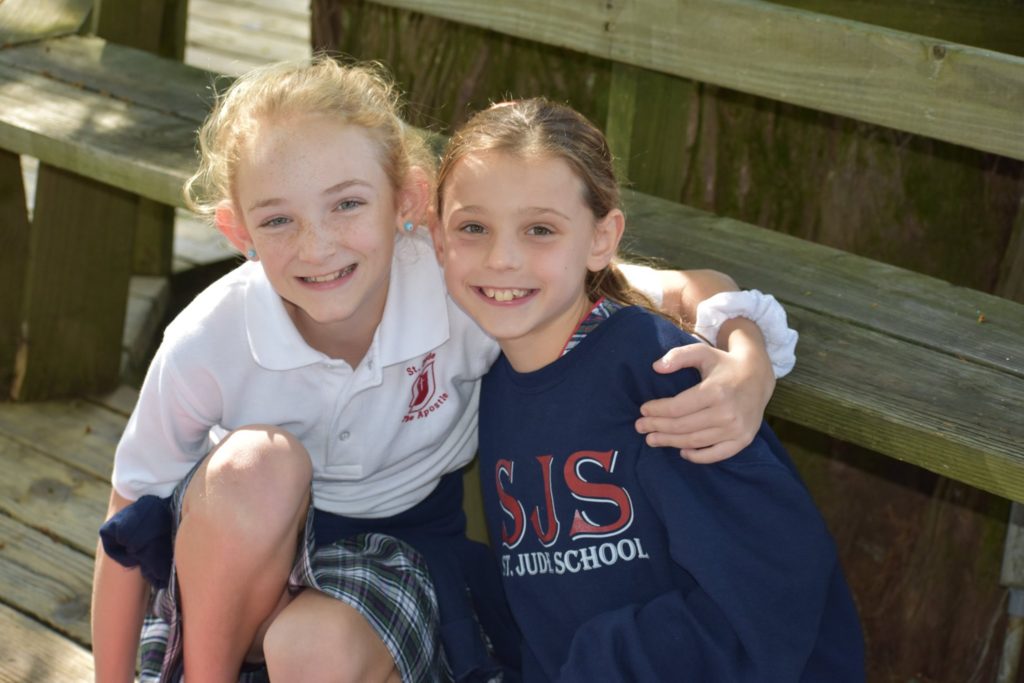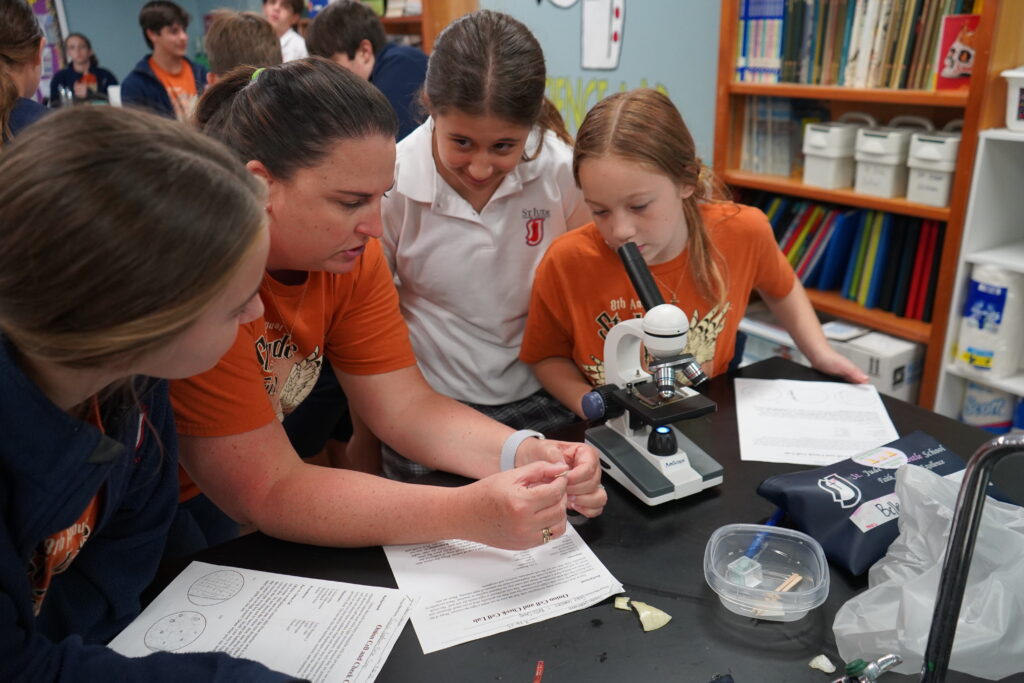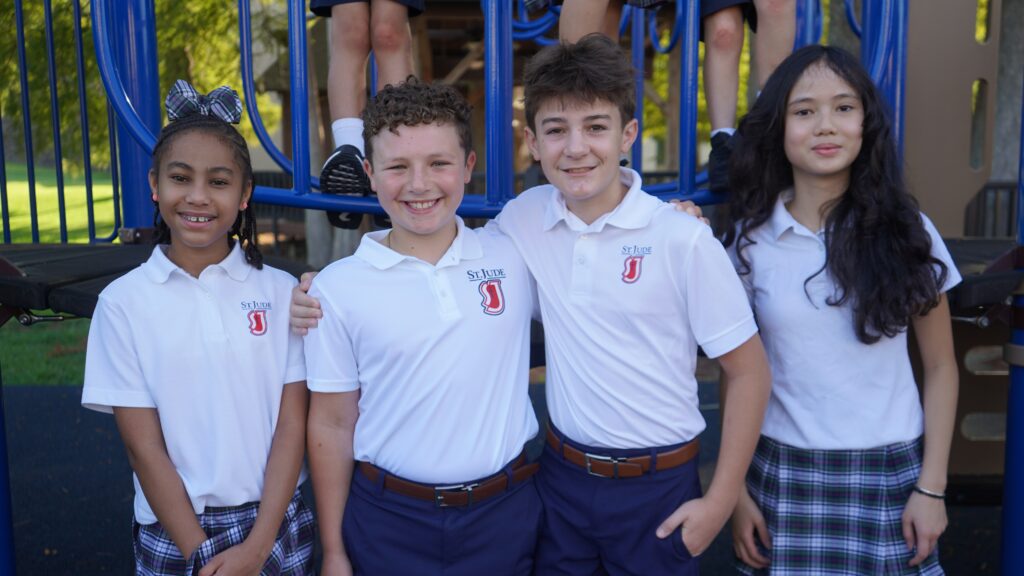Reading, English and Language Arts
For reading, English, and language arts instruction, St. Jude follows the academic learning standards developed by the Diocese of Baton Rouge. Grades 1-4 have tiered level reading classes that allow teachers to address different learning styles and accommodations through a variety of strategies such as reciprocal learning, cooperative learning, and differentiated learning groups. Through whole group instruction and small literacy center groups, instruction can be focused on phonemics, phonemic awareness, fluency, word decoding strategies, structural and textural analysis, and reading comprehension by utilizing Thinking Maps, hands-on activities and leveled readers. With the Accelerated Reader (AR) program, teachers can use detailed data to closely monitor and analyze each reader’s progress as well as instill a love of reading through incentives such as the AR store in which students use their points as money to buy prizes at the end of each semester. Small group writer’s workshops, journal writing, and various writing projects, such as persuasive letters to the principal, encourage written expression. For grades 2-4, Wednesday Write-On incorporates creative and narrative writing with peer conferencing. Building vocabulary is a priority in grade 4 and culminates with the “Orange Vocabulary Parade” in which students select a literary term, create a costume, and act it out for their classmates and parents. To avoid any summer slide, teachers assign summer reading books to students in grades 4-8 that will be studied upon their return to school in August.
Novels, short stories, poetry and cultural literacy are all taught in middle school. Novels and short story units are read as a class and involve group activities, projects, as well as independent activities. The novel studies and group projects help students develop an understanding of disabilities, bullying, learning tolerance, and respecting others. Visual and performing arts are integrated with literature skills as students write scripts, create props, and design costumes to present original plays to school audiences. An annual production of “Shakespearience” is performed by 8th grade students at the conclusion of studying four of William Shakespeare’s plays. Cultural literacy is a central part of the middle school’s literature course work. The combination of vocabulary words and cultural literacy terms helps guide students to understand both the literal and figurative meaning of words. This knowledge affords students a deeper understanding of words and allows them to demonstrate ownership of the information through their own creative writing.
English is taught as a separate subject school wide in order to focus extensively on the parts of speech, grammar, and punctuation, as students apply it to writing. Students write in a variety of forms, including narrative, descriptive, persuasive, and expository. IXL English provides review and reinforces daily skills for students and assists the teacher to identify any skills, which may need reinforcement and even challenge.
Students are assessed every nine weeks with STAR reading to determine growth, zone of proximal development and proficiency in literacy skills. Data gained allows teachers to reteach skills or refocus on areas in need in their instructional planning.

Math
For mathematics instruction, St. Jude School follows the academic standards developed by the Diocese of Baton Rouge. In grades 1-4, tiered math classes allow teachers to address students’ different learning styles and accommodate them through a variety of strategies such as use of cooperative learning and manipulatives. Number and operations in base ten and fractions, operations and algebraic thinking, measurement and data, and geometry are addressed through instructional strategies such as instructional games, scaffolding, and students writing and solving their own math stories. Teachers work with students on becoming more comfortable with solving word problems by embedding the math skill being taught in the unit. Students learn a method to detect known information and unknown information and identify terms and words that lead to correct operational choices. These strategies allow students to apply them to real life problems through a variety of projects.
Cougar Facts is a unique math fact mastery program in grades 2-4 that involves students working as partners to orally review basic math facts of addition, subtraction, multiplication, and division as determined on a weekly mastery of basic facts as a foundation for advanced math skills. In Grade 4, students take a “preliminary” qualifying test to determine placement on the St. Jude competitive math team, which represents our school at the Diocesan Math tournament. Math team participants prepare after school by learning advanced skills beyond the 4th grade math curriculum. For the past two years, the St. Jude Math Team has placed first in this competition sweeping the majority if not all, of the honors given to students.

In middle school, the mathematics curriculum offers honors as well as on tiered level classes, so each student is challenged at their individual level and enhances standards based curriculum with outside resources. The 8th grade honors class allows students to receive a high school credit in Algebra I. St. Jude has a third of our students graduating 8th grade with Algebra I math credit, allowing them to enter advanced math classes in high school.
IXL Math is used for 2nd-8th grade students as an online resource during the school year and over the summer. During the school year, IXL math is used to monitor progress of skill development as well as provide reinforcement and/or challenging skills to meet student needs. In grades 6th-8th, students are required to keep an IXL mathematics journal where they explain how to work out four problems in their own words. This practice’s philosophy of explaining their work communicates and reinforces their understanding of the concept.
All 1st-8th grade students are assessed every nine weeks through STAR math to determine growth and to identify skills which need reinforcement. Students who need additional support and individual instruction can meet with teachers during class, before school, or during the day. A cooperative relationship is encouraged between students, parents, tutors, and learning specialists to promote each student’s success in math.
Science
The science curriculum based on Diocese of Baton Rouge standards follows an across the grade level learning progression with daily lessons built on students’ prior knowledge from previous lessons and life experiences. The elementary science curriculum is an age appropriate, hands-on program providing in-depth study focused on the world around them. The K-5 curriculum perfectly balances life, physical, earth and space sciences. Higher-order thinking questions direct students to gain a deeper understanding of acquired knowledge and apply this knowledge while promoting critical thinking skills. Powerful vocabulary, informational text, writing on projects, and observation reports align with DBR ELA Standards. Students are exposed to a variety of teaching methods, which include lectures, projects, hands-on demonstrations, STEM and laboratory experiments, and web-based activities. Each grade level participates in a STEM DAY to take students’ learning to new levels with hands-on experiences. Guided inquiry methods help the elementary students develop scientific skills and concepts that reach across the science discipline. The middle school science curriculum is based on continuous and increasing levels of analysis with concentration in earth, life and physical sciences. All levels of middle school science include graphing, data analysis, and the scientific method. Differentiated instruction is used daily and includes small group work on readings and formative questioning, partner work on activity based labs and modeling. Problem-based learning involves students in small groups completing STEM based projects. Tiered instructional approaches include leveled questions within IXL programs and optional leveled reading of material for below benchmark students. Technology use in the classroom involves Google classroom and virtual labs. Students are assessed using formative and summative testing methods and participate in the local and state Science Fair.
Social Studies
The social studies curriculum in grades K-8 as steered by the Diocese of Baton Rouge standards provides a sequential base across grade levels in the areas of history, geography, civics and economics. The elementary social studies curriculum integrates theme-based lessons focused on the reading of informational text and writing. The daily course work provides students with opportunities to develop chronological thinking skills, an understanding of connections between physical and cultural environments, and their role of a responsible citizen. Students begin to understand economic concepts, develop decision-making skills, explore the role of a global workforce and global interdependence, as they work together to resolve conflict and understand the importance of respecting differences. These concepts are reinforced in various classroom strategies such as partner and group projects, virtual tours of national and world landmarks, STEM activities on landforms, research on famous Americans with oral presentations, and creating and presenting state brochures on selected states. The middle school continues to delve deeper into the four social studies areas. The teaching strategies include lectures with Power Point presentations, group projects, class discussions, current events review, and videos of historical events. The continued cross-curricular reading of informational text and writing is evident in students’ plantation brochures and classroom engagement in STEM activities about geography. In 4th-8th grade students participate in the National Geography Bee at the local, state and national level. The 7th grade students participate in Law Day dedicated to role play a court session and witness a naturalization ceremony. The 8th grade students participate in Youth Legislature, which involves running for office and bill presentations, thereby bringing this content to life. Field trips include visits to local plantations, Avery Island, New Orleans landmarks, and “The River Dynamic Experience” at Louisiana Arts and Science Museum.

